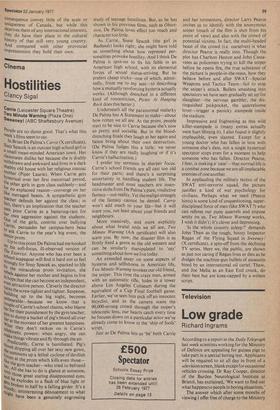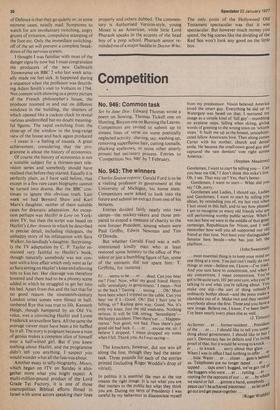Television
Low grade
Richard Ingrams
According to a report in the Daily Telegraph last week scientists working for the Ministry of Defence are appealing for guinea pigs to take part in a special boring test. Applicants will be required to sit all day in front of a Lelevision screen, blank except for occasional vehicles crossing. Dr Ray Cooper, director of the Burden Neurological Institute at Bristol, has explained, 'We want to find out what happens to people in boring situations.'
The answer which after some months of viewing I offer free of charge to the Ministry of Defence is that they go quietly or, in some extreme cases, noisily mad. Symptoms to watch for are involuntary twitching, angry grunts of irritation, compulsive stamping of the foot etc. Only the immediate switchingoff of the set will prevent a complete breakdown of the nervous system.
I thought I was familiar with most of the danger signs by now but I must congratulate the producers of the new Galbraith Yawnoratna on BBC 2 who last week actually made me feel sick. It happened during a sequence when the professor was describing Adam Smith's visit to Voltaire in 1764. Not content with showing us a pretty picture of the French philosopher's house, the producer zoomed in and out on different windows in the building, the shutters of which opened like a cuckoo clock to reveal various unidentified but no doubt meaningful figures. The rapid switching from the close-up of the window to the long-range view of the house and back again produced —I swear it—a feeling of nausea. A great achievement, considering that the programme is about the history of economics.
Of course the history of economics is not a suitable subject fOr a thirteen-part television series and somebody should have realised that before they started. Equally it is perfectly plain, as I have said before, that except in a few rare cases biography cannot be turned into drama. But the BBC continues to ignore this obvious truth. Last week we had Bernard Shaw and Karl Marx's daughter, neither of them suitable cases for dramatic adaptation. An exception perhaps was Hazlitt in Love on Yorkshire TV, but then the script was based on Hazlitt's Liher Anions in which he described in precise detail, including dialogues, the unhappy story of his infatuation with Sara Walker, his landlady's daughtet. Surprisingly the TV adaptation by C. P. Taylor remained very faithful to Hazlitt's book, though naturally somebody was not content with a love affair which only went as far as Sara sitting on Hazlitt's knee and allowing him to kiss her. Her cleavage was therefore lowered and there had to be a phoney scene added in which he struggled to get her into his bed. Apart from this and the fact that for no good reason the nineteenth-century London street scenes were filmed in halftimbered Rye this was true to life. Kenneth Haigh, though hampered by an Old Vic voice, was a convincing Hazlitt and Lynne Frederick an excellent Sara. All the same the average viewer must have been a bit baffled by it all. The story is poignant because a man of genius makes a complete idiot of himself over a half-witted girl. But if you knew nothing about Hazlitt. and the programme didn't tell you anything, I suspect you would wonder what all the fuss was about.
Another essay in telly-biography, Moses, which began on ITV on Sunday is altogether more what you might expect. A multi-million-pound product of the Lord Grade Tat Factory, it is one of those cosmopolitan Biblical efforts filmed in Israel with some actors speaking their lines properly and others dubbed. The commentary is Authorised Version-style, young Moses is an American, while little Lord Pharaoh speaks in the accents of the head boy of a prep school. Pharaoh senior reminded me of a major baddie in Doctor Who.
The only point of the Hollywood Old Testament spectacular was that it was spectacular. But however much money you spend, the big scenes like the dividing of the Red Sea won't look any good on the little box.



































 Previous page
Previous page